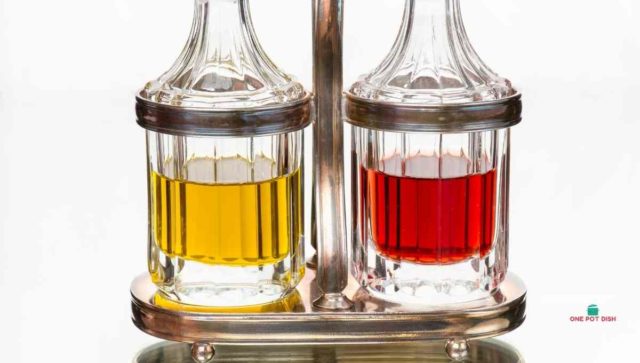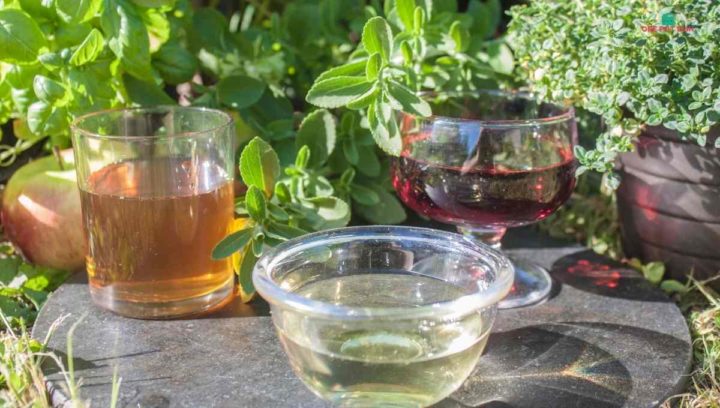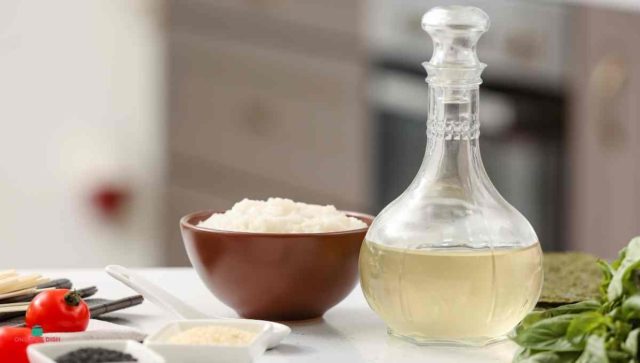Rice Vinegar vs White Wine Vinegar
You can find white and rice vinegar in various recipes. They both have acetic acid as their base compound, though they also have different characteristics.
If you’re developing a taste for white vinegar, try taking a small sample and seeing how it reacts to your taste buds. However, if you’re craving a sweet taste, try taking a little bit of rice vinegar.
Rice Vinegar vs. White Wine Vinegar
The primary distinction between white vinegar and rice vinegar is their taste. Unlike most types of vinegar, rice vinegar has a sweet and sour taste.
White wine vinegar is a fermented wine with a higher acid content than rice vinegar. Both types of vinegar originate from fermented bases. While rice vinegar has a sweet flavor, white wine vinegar has a more intense and acidic taste. You can also see mirin vs rice vinegar.
But if you’re looking to save money, you can always buy white vinegar at a lower cost. There are many brands available online, so you’ll have no trouble finding one that suits your budget.

What Is Rice Vinegar?
Any sort of vinegar has a strong acidic taste, but that doesn’t mean that all vinegar can be used together.
Rice wine vinegar is a fermented rice product made by fermenting the sugars and starches in the rice until they turn into alcohol. It produces a strong acidic taste.
Aside from being used in Asian cooking, rice vinegar is also commonly used in various other applications, such as making light and refreshing salad dressings and dipping sauces. It’s a staple in Vietnamese, Korean, and Japanese pantries.
As far as fermented flavor enhancers go, rice vinegar is the most common one to use in Asian cooking. But its gentle and slightly sweet flavor can assist season as well as balance any style of cooking. It is also called rice wine vinegar. It is also called rice wine vinegar.
Another interesting fact: This sauce comes in a wide range of colors, from clear to reddish through to brown.

What Is White Wine Vinegar?
White wine vinegar is acetic acid derived from fermented grains or alcohol. A dilute solution of this acid with water produces a powerful acid ranging from 4% to 7%.
Unlike other white vinegar, which has varying acid levels, It is stronger than rice vinegar and not very sweet.
Although white vinegar is strong, you should only use it in moderation to avoid burning and cleaning counters and pans. It can also balance out sweet flavors in various food items, such as ketchup and barbecue sauce.
If you own a large bottle of white wine vinegar, then pickling or fermenting it will be your jam. Aside from being a great kitchen staple, you can use these types of vinegar in other recipes.
In most cases, white wine vinegar can be used in the same amount as rice vinegar. For other recipes, you can add less, starting with about 1 quarter and gradually building up from there.

Is Rice Vinegar the Same as Rice Wine Vinegar?
Contrary to popular belief, rice vinegar is not similar to fermented wine turned into vinegar. It has a different flavor and acid properties than white wine vinegar.
A white wine vinegar has a higher acid level than a rice wine vinegar, making it more acidic and suitable for different dishes. These characteristics make it ideal for other purposes.
The delicate flavor of rice vinegar is ideal for various dishes, such as stir-frys and rice dishes. White wine vinegar is also great for dressing and marinades. Both types of vinegar are to complement fish. Their intensity and acid properties will vary.
What Are Other Differences Between Rice Vinegar and White Vinegar?
The intensity of the acidic or sourness levels in white and rice vinegar vary. For white vinegar, the level of intensity is typically very high.
Both types of vinegar are transparent. White vinegar has a whitish appearance, while rice is usually pale yellow. Other types of vinegar are also colored.
The base ingredients used to make rice and white vinegar vary depending on their source. Corn or other grains make white wine vinegar, and rice originates from regular white rice.
There are multiple types of vinegar on the market, but their essential function is to add flavor and acidity to your food.
Although you can make both types of vinegar from fermented rice, the shelf name of rice wine vinegar is the same.
Can You Substitute Rice Vinegar for White Wine Vinegar?
You can use white wine vinegar to substitute for rice wine, but it has a harsher flavor than rice vinegar. To avoid getting stuck with a taste that’s too harsh, try reducing the white wine vinegar you use. You can also add water when using it in cooking your favorite food.
Other Types of Vinegar
Malt Vinegar
It’s not an essential ingredient; we’ve seen it on the table and in our lives. This dark, toasty, and slightly acidic beverage is made from ale and has a distinct flavor.
Malt vinegar enhances the flavor of potatoes or French fries. You can also use it to create a unique marinade or vinaigrette.
Apple Cider Vinegar
This type of vinegar is a fermented liquid made from the juice of the same fruit. It comes from crushed and squeezed apples. After fermentation, manufacturers transform the sugars into alcohol or vinegar.
After you ferment the concoction, you can turn it into a type of vinegar in the presence of acetic acid and malic acid.
It is a liquid with a mild taste that you can incorporate into food and drink applications. You can utilize it in diverse ways, such as salad dressings and food preservatives. You can also use it to make pickles.
To achieve a more balanced flavor, add a little sugar to the beverage to make it resemble rice vinegar. Add a small amount of sugar to each tablespoon of vinegar to reach a particular taste.
Balsamic Vinegar
Balsamic originates from grapes with a must, a type of Italian grape. You will boil the must to a syrup in most cases before being aged in wooden kegs.
As the moisture evaporates, the syrup is transferred into smaller batches, concentrating the flavor further. This kind of vinegar needs a minimum of 12 years of process.
The resulting product is a thick, dense liquid ideal for drizzling or drinking straight. It’s also the product that packs a punch in your wallet. These products are also known to pack quite the point regarding their price.